|
|
| |
| |
|
hello and wellcome to the autumn edition of our newsletter!
|
| |
|
As time passes, RESTART_4Danube's activities slowly got on fire. The project is running over a year now, about half of its entire implementation period. Therefore, the consortium is planning the project midterm event. Also, partners are in heated preparations to best organise one of the most important outputs of the project – the 5 local action plans (LAPs).
|
|
| |
|
midterm event on 28.10.2021
|
| |
|
Project partner University of Maribor is organizing a midterm conference, entitled »Creative Urban Regeneration Day in the Danube region« as part of the RESTART_4Danube project on the 28th of October 2021, serving also as a huge networking event. The event is organised for companies, researchers, intermediary institutions, policy makers and other interested participants, who will get a chance to learn more about the different opportunities that the European Commission is offering for the creative and cultural sector. Moreover, the RESTART_4Danube project will be presented our latest plans for the local action plans with the aim of promoting urban regeneration in the Danube region to a wider audience. The final part of the conference will be dedicated to the exploration of already exiting best case examples implemented in Slovenia and abroad. At the same time as the Midterm conference, a B2B event will be organized by Enterprise Europe Network where participants from a wide range of different CCIs can meet and discuss future collaboration possibilities.
There are also several other activities which will take place after the event – a Danurban taskforce meeting, where all interested participants from creative and cultural sectors will be invited to attend and collaborate as taskforce members; a capitalisation workshop, where we will hear about many other creative projects and try to find new synergies between us; and finally, a study visit for the RESTART_4Danube partners, which will also be open to other participants who would like to join.
The event will be held as a virtual conference online, and it will offer participants a comprehensive experience of a virtual environment, filled with captivating content – from business offers and business requests from participants around the globe, to project presentations and the effects of their results on their regions, as well as information about funding opportunities currently available for creative industries sector and much more. All information regarding the event will be published in the coming weeks on the organiser’s webpages:
Slovene webpage
English and Slovene page
|
|
| |
|
methodology for the local action plans
|
| |
|
University of Maribor (UM) team has developed a common methodology for the development of LAPs. The aim of the authors was to create a roadmap that effectively signposts the steps towards realising the local action plans in five diverse cities and reflects the common strategy of the RESTART_4Danube project. The document provides a set of clearly defined guidelines and a common framework for the development of LAPs which will be implemented in Craiova (Romania), Rijeka (Croatia), Maribor (Slovenia), Vas County (Hungary) and Vratsa (Bulgaria) in the period between January and September 2022.
In order to support the organisers of the future LAPs, UM organized LAP workshops with each of them. Excepting the tandem from Maribor, which met in person to brainstorm and discuss ideas for the implementation of actions in their hometown, the support was carried out via online platforms
During the workshops, UM Team offered all tandems additional support and helped resolve any remaining doubts they may have had regarding the instructions provided in the common local action plan methodology. For the second part of the support workshops, tandems were asked to prepare a short summary of the main conclusions from their policivil workshops held earlier this year and to present the concepts and ideas they have been developing over the past weeks. While the main objective of the meetings was to provide assistance to municipalities and local partners during the development and elaboration phase, it was also a great opportunity for the University of Maribor team to gain a better insight into the inspirations, desired outcomes, and potential obstacles the tandems are facing. Although the meetings will continue to be held virtually in the coming weeks, the team will continue to support the tandems throughout the development and elaboration phase. The preliminary drafts of local action plans will be presented to the wider public during the midterm event.
Warm thanks to our partners from UM for these developments and their contribution to this newsletter!
|
|
-------------------------------------------------------------------------------------------------------------------------------------------------------
| |
|
Restart_4danube’s policy and stakeholder dialogue Workshop series (2)
1st RESTART_4Danube Policy dialogue workshop:
|
| |
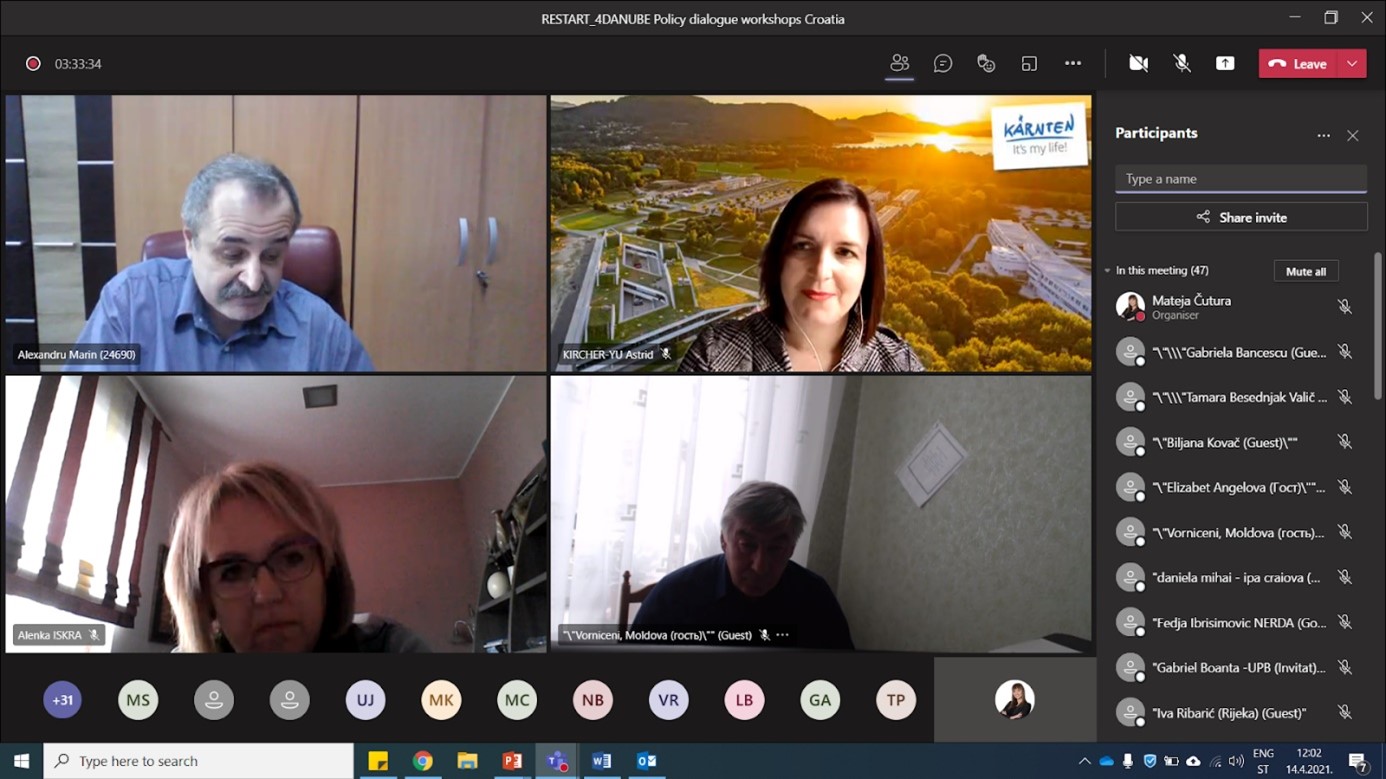 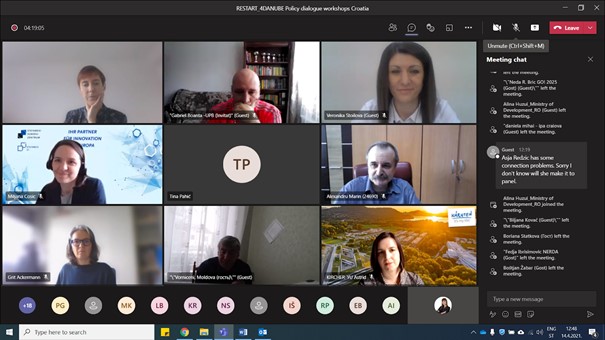 |
|
The purpose of this event was to raise the political visibility of creative and cultural industries and creative urban regeneration. Local, regional, national public authorities as well as priority area (PA) coordinators from PA3 and PA8 attended the first policy workshop of the project.
Experts from eight Danube region countries discussed also the role of the creative and cultural industry in urban regeneration. Currently the project partners are working on the prepation of the local action plans, which will be designed this year and implemented in 2022. Further info on this initiative further in this newsletter.
The second policy dialogue workshop of RESTART_4Danube to take place in Uzhgorod, Ukraine will be held in early 2022.
Special thanks for this contribution to our partner PBN!
|
| |
|
-------------------------------------------------------------------------------------------------------------------------------------------------------
| |
|
Contribution of RESTART_4Danube’s lead partner UPB on the effects of COVID-19 on cultural and creative industries for urban regeneration:
|
| |
The cultural & creative industries (CCIs) were among the most severely impacted sectors by the COVID-19 pandemic. According to preliminary estimates by Eurostat, the COVID-19 crisis may affect about 7.3 million cultural and creative jobs across the European Union (EU) and over 30% of the people affected are self-employed and lack adequate social protection.
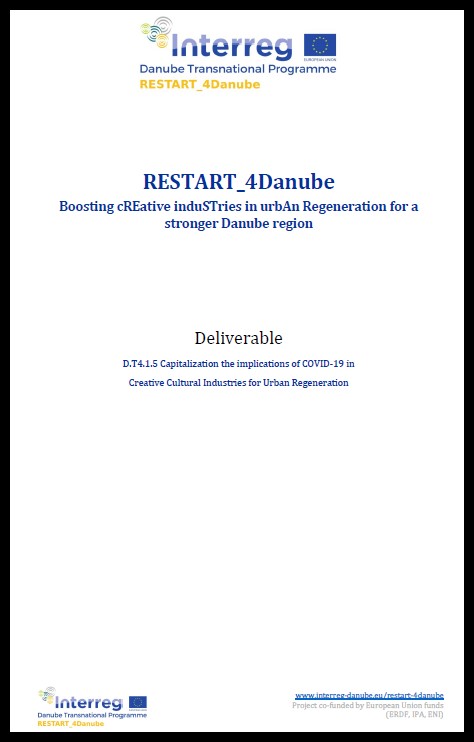 |
|
Today, it is almost impossible to predict when and how a recovery of the CCIs will take place. It is also hard to estimate both the role and contribution of the cultural sector to national economies and to the world economy, and the amount of actual personnel employed in the sector. Furthermore, the state-of-the-art varies immensely across the Danube region (DR), within each country (e.g. in regard to the capital city, other towns and rural regions) and across sectors (the music or movie sector as opposed to museums or performing arts).
|
The lockdown and social distancing measures have also made evident the importance of arts and culture for people’s mental well-being – and possibly, through the increasingly documented psychosomatic effects of cultural access, also for the mental health of citizens. This understanding provides a new opportunity to capitalise on the role of arts and culture in the prevention and treatment of illness across the lifespan, contributing to solutions for health and welfare systems, such as through reductions in hospitalisation or medication rates.
Urban communities, including the creative ones, have been at the epicentre of the COVID-19 pandemic experiencing the highest rates and the biggest economic impact. However, their role in driving national productivity and growth is not to be overseen, and they also hold the key to recovery and levelling up across the DR.
Collaborative economic governance should be at the heart of this process, involving citizens, anchor institutions, businesses and investors in shaping a new vision for their places, that will need to respond to the three great challenges: net zero emissions, “Peak Retail” and “Peak Office”, through re-purposing vacant sites, re-imagining city centres, rebalancing urban geographies and creating jobs.
Digitalisation can be seen as the “opportunities to transform a physical product into a service”, e.g. a book into an eBook, or even a physical facility into a dematerialized service, when banks branches migrate to the app store – accessible through smartphones. Nonetheless, it is worth to note that being on the internet is not enough.
For the CCIs, the Coronavirus has already accelerated the digitalisation processes at a dizzying speed. Even more importantly, it has made clear that culture does contribute to the social and economic vitality of our societies: culture and the strictly connected sector of tourism have been widely recognised as some of the most affected sectors by COVID-19.
All the presented challenges are included in the territorial strategy of the Interreg programme and to be seen in the broader context of existing strategic frameworks such as the EUSDR perspectives (especially with regards to PA 7, PA 8 and partly PA 9), the Territorial Agenda 2030, the New Leipzig Charter, the Recovery and Resilience Facility and the European Green Deal.
|
-------------------------------------------------------------------------------------------------------------------------------------------------------
| |
|
EU Strategy for the Danube Region – EUSDR
&
Synergies with the CINEMA project (5)
|
| |
|
In contact with priority area coordinators, RESTART_4Danube and CINEMA project partners are trying to implement a synergetic initiative of organising a session on the topic of Culture and Creative industries and their contribution to innovation and revitalisation of urban economies during this year’s EUSDR Annual forum. The 10th Annual Forum of the EU Strategy for the Danube Region is under the presidency of the Slovak Republic and will take place in a hybrid format on 26-27 October 2021.
|
|

|
| |
|
|
Will it be possible for this session to take place, how and when exactly?
What is the structure and plan of this ambitious activity of RESTART_4Danube and CINEMA?
How can I register?
Answers to these questions and much more will be made public on RESTART_4Danube’s social media channels as soon as the organisers agree on them. For all freshly baked news, stay tuned on:
|
-------------------------------------------------------------------------------------------------------------------------------------------------------
| |
|
Synergies with the WOMEN IN BUSINESS project (2)
|
| |
On the 25th of August 2021, several RESTART_4Danube partners met with WOMEN IN BUSINESS lead partner RAPIV with the aim of assessing the interest and possibility of capitalization activities between the two projects.
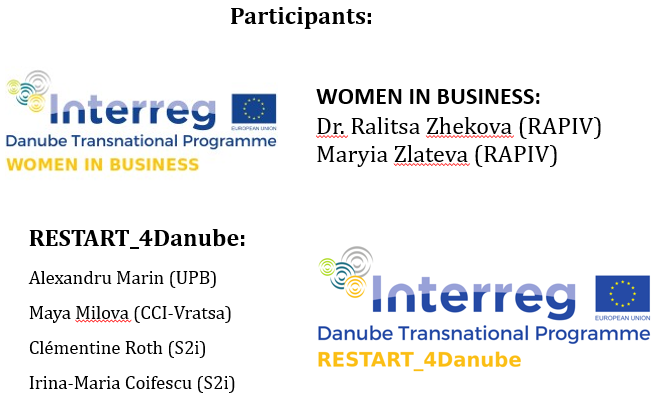 |
|
In the project RESTART_4Danube, S2i is responsible for a deliverable that foresees the elaboration of at least one joint deliverable or output with other projects. RESTART_4Danube partners tried to find common grounds with RAPIV for the two projects to develop a common deliverable.
|
WOMEN IN BUSINESS is currently in the process of analysing over 700 gathered questionnaires, which they had prepared and distributed in the frame of the project and was regarding a specific project topic.
RAPIV agreed to gather/extract relevant information regarding CCIs from their survey and hopes to have a first draft of their study ready soon, in order to forward it to the RESTART_4Danube partners. From here, Mr. Marin (UPB) and Mrs. Roth (S2i) agreed to scout for ideas and come up with concrete suggestions for a joint deliverable by Mid October – to be then discussed and agreed with RAPIV.
All present partners agreed to work together on the joint deliverable in November 2021.
More information about the development of the joint deliverable – in our winter session newsletter!
|
-------------------------------------------------------------------------------------------------------------------------------------------------------
| |
|
preparing the project's local action plans (2)
lap in rijeka, croatia
supporting ccis in rijeka via laps in two similar projects:
|
| |
City of Rijeka, as a part of Croatian tandem of RESTART_4Danube project, is developing a LAP on the topic “Sustainable regeneration of industrial buildings”. The plan will support CCIs through the use of refurbished industrial spaces transferred into new facilities with a new purpose. The main direction, resulting from the project Policivil workshop that took place earlier this year with local stakeholders, is to introduce modern technology and its benefits to entrepreneurs, potential entrepreneurs and young people, especially in the field of CCIs, which is aligned with city of Rijeka’s Plan of development for 2021-2027.
|
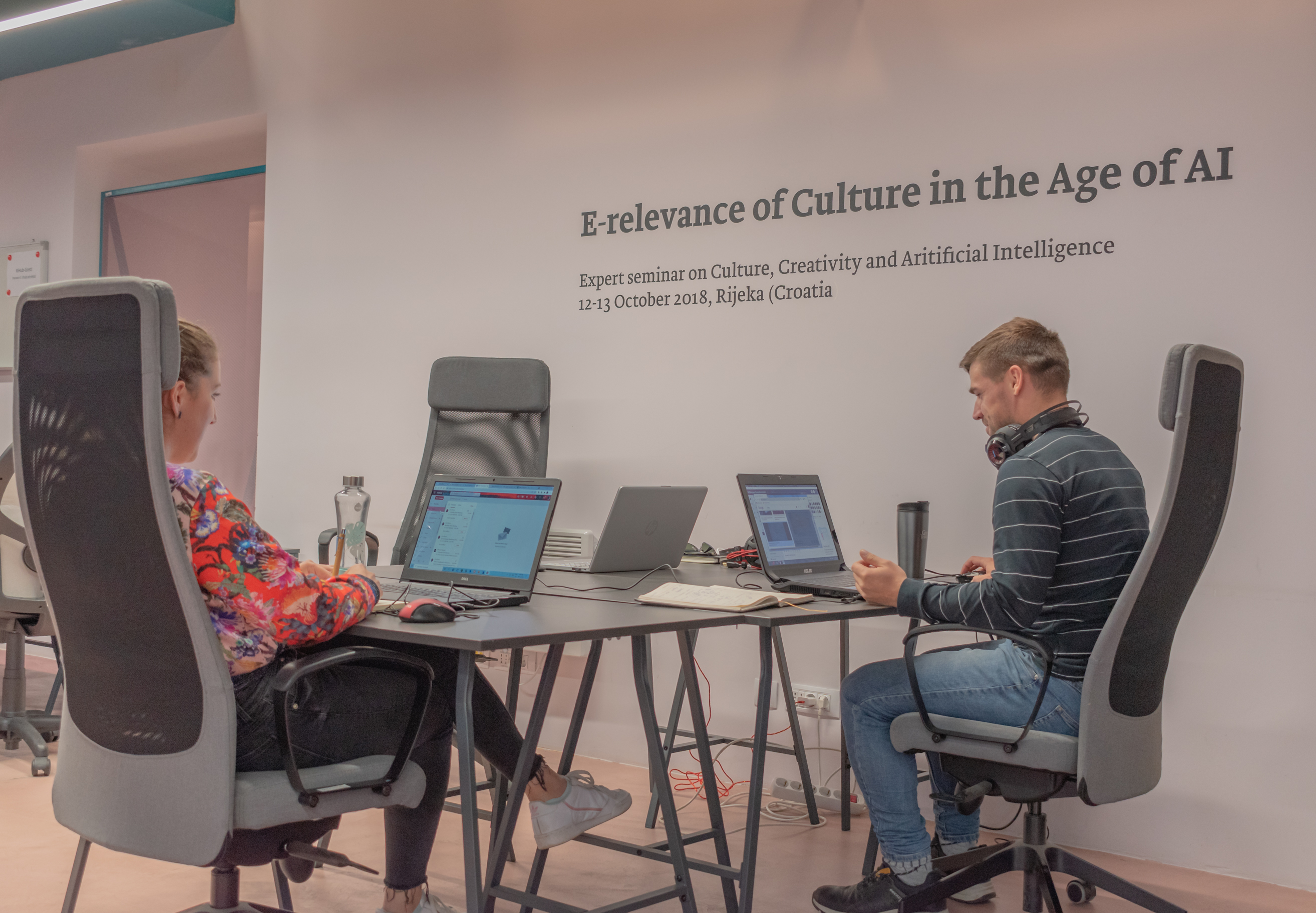 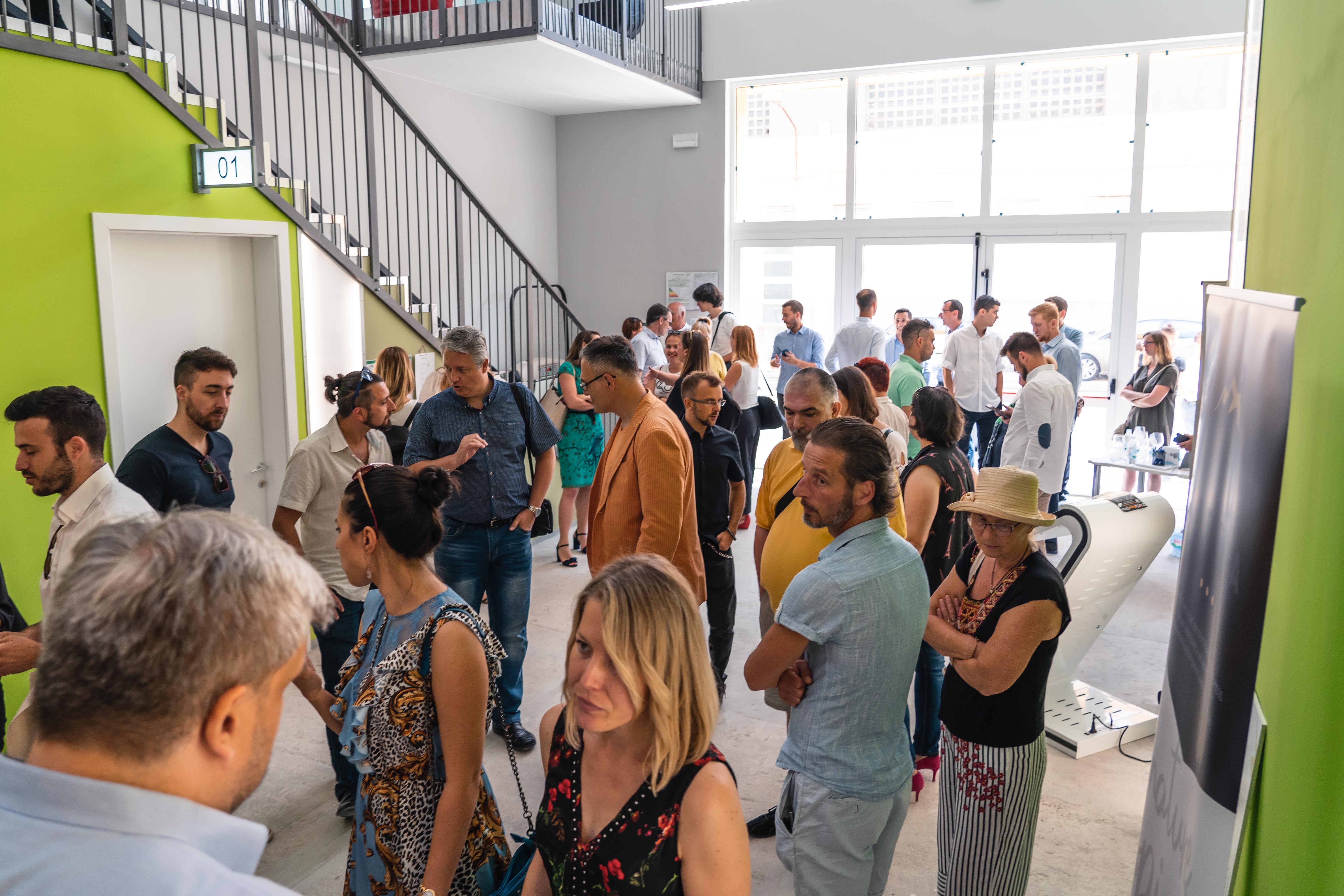
In addition to LAP within RESTART_4Danube, City of Rijeka already developed another LAP within the Interreg Europe project ECoC-SME. This local action plan is also focused to support CCIs in terms of improvement of entrepreneurial skills and digital literacy, networking, cross- and inter-sectoral collaboration, as well as ensuring organizational and program conditions to host and support the creative community. The first action includes the creation of a digital tool, “Creative Doctors”, with the main purpose of facilitating the interactions between “patients” (i.e. those who have a problem) with “doctors” (i.e. those who provide solutions). An early version of this tool will be intended for Startup incubator Rijeka users and ex-users, while the “doctors” will be mainly mentors. The second action is dedicated to strengthening entrepreneurial skills of artist, freelancers, Startup incubator’s users and entrepreneurs working in CCIs. A new educational module “Creative module” within the Startup incubator’s program will be established, addressing the topics of greate interest for target group. Finally, the third action will result with comprehensive document on Government model of RiHub center (creative hub with co-working space and headquarter of Startup incubator), elaborating main issues in management, positioning, program, participation mechanism, communication, visibility, etc.
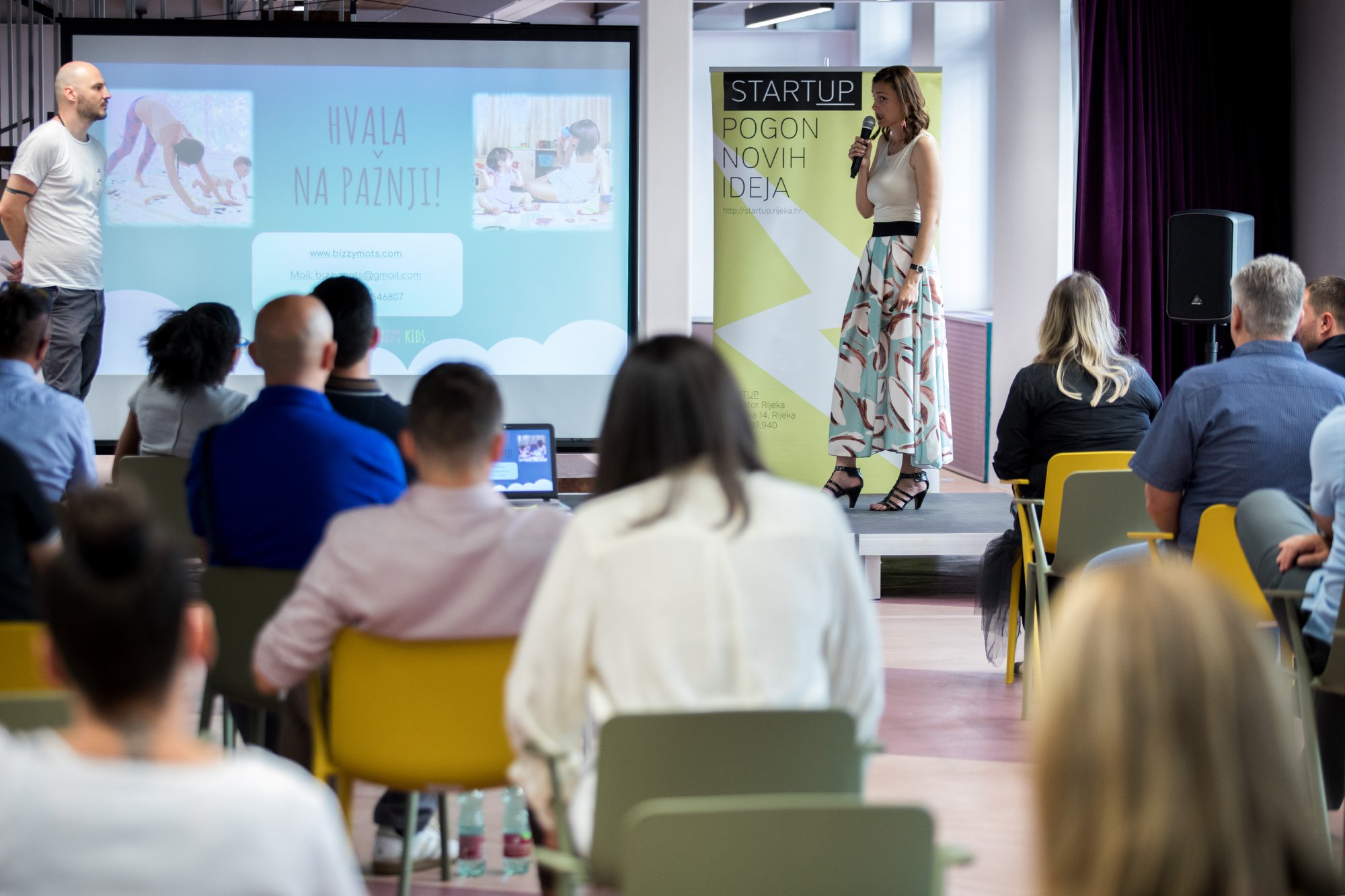
Both LAPs are focusing on CCIs and both will be implemented in the 1st half of 2022.
Main contributor – City of Rijeka
|
| |
|
| |
|
Preparing the project’s local action plans (2)
LAP in Craiova, Romania
|
| |
IPA Craiova and Craiova City Hall, partners of the project, will implement in Craiova, in South-West of the Oltenia region, Romania a local action plan - LAP.
The LAP in Craiova will develop cultural and creative spaces, namely:
1. The incubator center for technologies and business, in the creative and cultural industry sector, which includes a hub for innovation services, which serves the 3 actions and offers business internationalization services.
2. Museum of Science, action with implementation in the period 2022-2027.
3. Industrial park for new software and technologies that will be implemented in the period 2022-2027.
Article published in the local press, on 19 August 2021.
Contact person for details about the LAP:
Dr. eng. Gabriel VLADUT, Manager
E-mail: office@ipacv.ro
Tel: +40 351418882
Main contributor – IPA Craiova
|
-------------------------------------------------------------------------------------------------------------------------------------------------------
| |
|
project results - Technology transfer to facilitate creative urban regeneration for SMEs in the CCI sector
|
| |
In the framework of the project, the partner IPA Craiova developed a form, a methodology and a tool for service offer (SO) and service request (SR), aiming to support an entity who has developed a new technology present and advertise it in order to realise a technology transfer (TT), to understand the expertise and experience of the potential partners for business, innovation, and knowledge. Technology transfer is the process of transferring skills, knowledge, technologies, methods of manufacturing, samples of manufacturing and facilities among governments, research institutes or universities and other institutions. TT is done to ensure that scientific knowledge, services and technological developments are accessible to a wider range of users who can then further develop and exploit the technology into new products, processes, applications, materials or services.
The new tools developed will be used to perform 15 SO and 10 SR to enterprises within the RESTART_4Danube project, especially to small and medium enterprises and higher education institutions in the CCI sector. Because of the specificities of CCIs covering i.e. design, animation, digital media, performing arts or fashion, software, traditional arts, the tool will be tailored to these non-traditional industrial types of products, services and technologies, products and services, and adapted to the target group of artists and creative entrepreneurs, mainly like start-ups or spin-offs, incubated in refurbished former industrial facilities or grouped in cultural and creative quarters/ incubators/ parks.
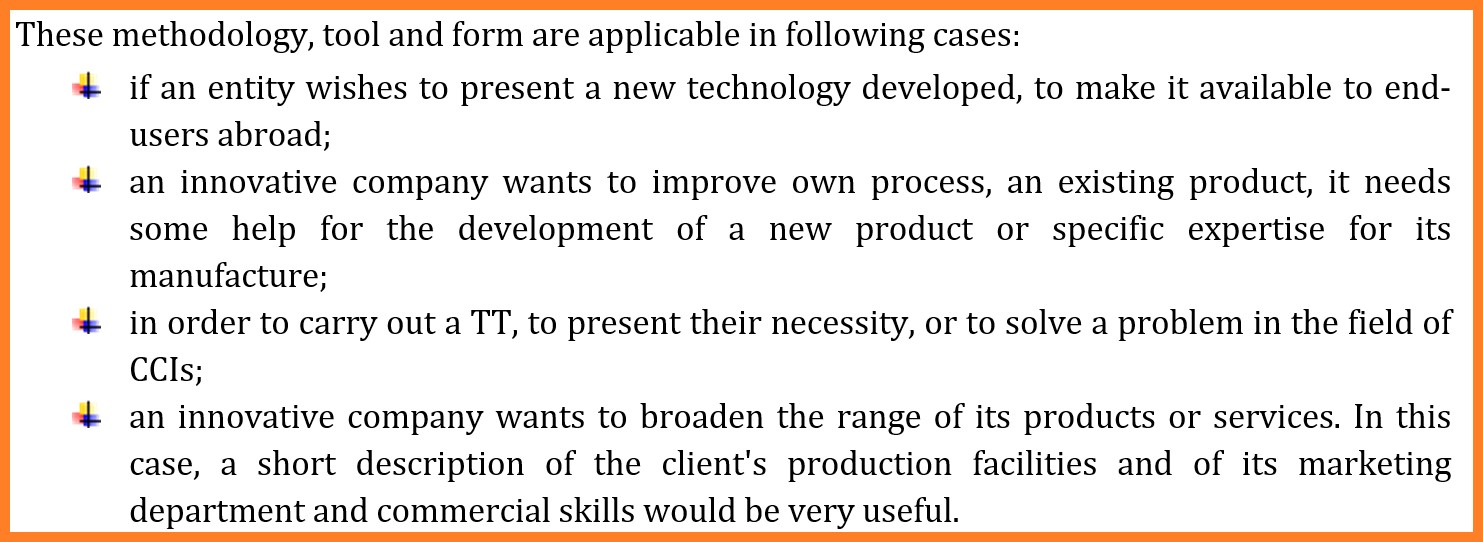 |
| |
|
The SOs and SRs will be generated in correlation with the LAPs developed in each city. This works like like:
The company should write a SO if it develops a technology or an innovation and wishes to make it available to end-users abroad in order to carry out a technology transfer.
The company should write a SR if it needs a specific technology or an innovation and wishes to apply it in their own company.
For more information please contact:
Dr. eng. Gabriel VLADUT
Institution & position: SC IPA SA, Manager,
E-mail: office@ipacv.ro
Tel: +40 351418882
|
|
| |
|
project results - action plan for the establishment of a network of creative urban service hubs
a summary
|
RESTART_4Danube project partner CCI-Vratsa drafted an action plan for the establishment of a network of creative urban service hubs. In this document, they give guidelines on how to create an effectively working creative hub that can directly benefit the creative and cultural industries in the Danube region. When creating the action plan for the network of creative hubs as one of the crucial actors supporting CCIs, the effects of the COVID-19 pandemic have been taken into account, since the lockdowns have affected the hubs immensely.

After its establishment, the network will support the policy dialogue and good practice exchange in creative urban regeneration by establishing a transnational partnership network, based on Policy dialogue workshops and Danurban taskforce meetings, mainly focused on supporting innovative SMEs in the field of CCIs to have a stronger orientation towards business-to-business markets and act as a horizontal enabler of added-value in urban communities, but also on study visits & city summits encouraging peer-to-peer exchange & assessments. Moreover, the creative urban service hubs will encourage regional multi-partner cooperation (including universities, industry associations, chambers of commerce, incubators/accelerators, regional development agencies and even governments).
The associated partner NICH, who is a member of the European Creative Hubs Network (ECHN), will serve as a contact partner for the network – contacts are to be provided in the next newsletter, next to further developments on this topic.
The role that networks play in the emergent global economic dynamics has become prominent in economic geography in the last years. Furthermore, networks of creative industries have proven to be valuable forms of support for macro-, medium and small-sized companies and entrepreneurs as a means to access support, information and knowledge. The networks in the creative economy highlight the overlapping connections between socio-cultural and economic networks. The successful urban regeneration activities implemented within the RESTART_4Danube project will be the result of a collective vision, realized through creative and enduring networking among the community, government, university, developers and professionals involved in its design, delivery, governance and maintenance.
Main author: CCI-Vratsa
|
| |
|
project results - RESTART_4Danube’s Danurban Taskforce (2)
|
| |
| |
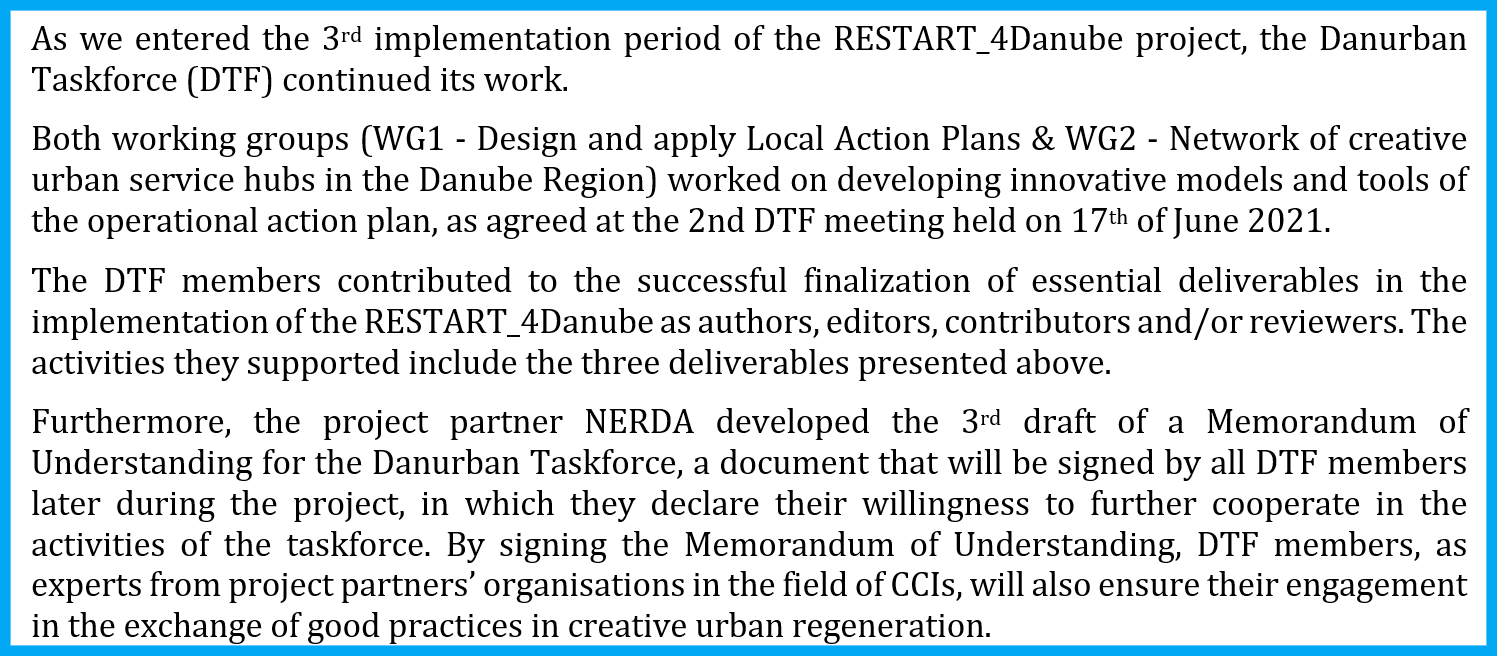 |
|
Many thanks to our partner NERDA who is supervising the DTF activities!
|
|
-------------------------------------------------------------------------------------------------------------------------------------------------------
| |
|
Culture and creative industries & urban regeneration in the danube region – Chisinau, Moldova
chisinau state circus – from ruin to become a masterpiece and thus preserve cultural legagy with european funds and support
|
| |
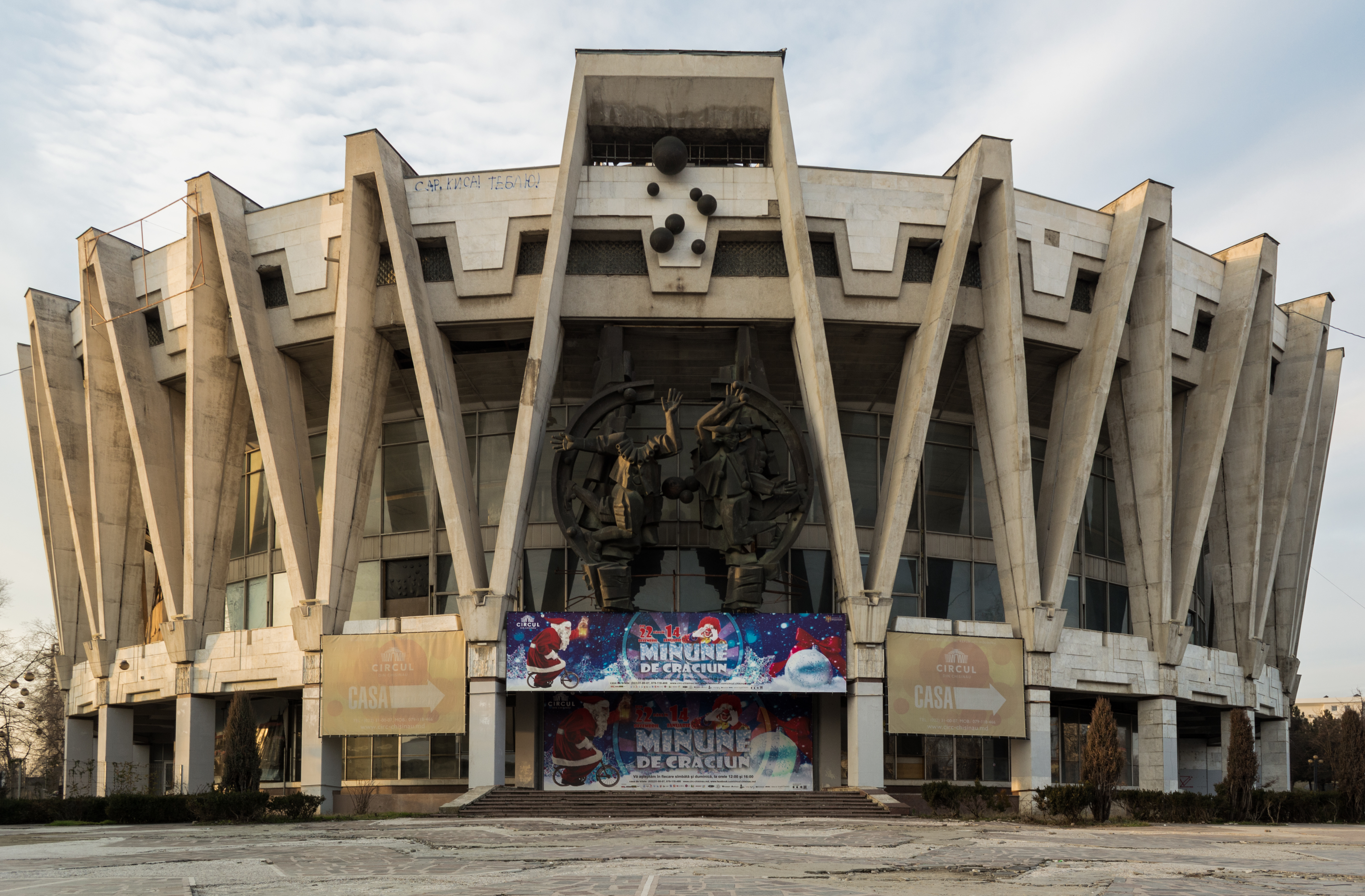 |
| |
|
The Chisinau State Circus is one of the most impressive buildings in Chisinau and holds a special place in the history and patrimony of Moldova and the entire Europe. With a capacity of 1,900 seats and a distinct 3D architecture that can’t be overlooked, the Circus was built back in 1981 and had once been considered the best circus in the USSR and the fourth biggest in the world. This influenced its popularity and attracted artists from all over the world, including Russia, Belarus, Ukraine, Germany, China, Finland and other countries. The arena had 13 meters in diameter and 1900 seats for spectators, with around 36-57 performances per month. Inside the Circus, you could find state-of-the-art equipment, spaces for rehearsals, a canteen, wide corridors and even a veterinary station.
After the country’s independence in 1991, the Circus almost became inactive due to the lack of funds and massive political changes. After passing through privatisation, the building was returned to the state patrimony and only the small arena of the State Circus was restored through a public–private partnership, with the official opening on the 30th of May, 2014.
The European Revival Project
Starting with 2019, the European Union supports restoration works at Chisinau Circus (big arena), in accordance with international standards. The project is carried out in the framework of the EU Confidence Building Measures Programme, implemented by UNDP. Approximately 2.5 million EUR are allocated for the Circus project and a total of other 10 small-scale sites are to be selected for renovation from the cultural-historical heritage. The Ministry of Education, Culture and Research cooperates with the Delegation of the EU for the reconstruction of the Circus. The project is supposed to be finished by the end of 2021 and aims at transforming the Circus into a large cultural center, respectively, into a multipurpose institution that will focus mainly on the presentation of circus performances, but will also provide various cultural and educational services: gala concerts, national and international festivals, theater plays, cinema, symphony orchestras and sports activities etc.
In regard to the restauration project, the technical expertise, renovation project and architectural conservation project have been designed. A digital copy of the Circus was created with a high precision laser scanner and will be used in the renovation process. Also, the model could be used, for example, to create a virtual museum of the Circus.
At the current moment in time, the restauration works still need to start, after selecting a contractor to carry out the reconstruction work. The responsible coordinator of the works asserted that the building will be restored according to European standards, it will have elevators and be adapted for people with special needs. It is foreseen that the renewed Chisinau Circus will serve as a modern multifunctional building, offering a fresh start for arts and culture in Moldova, but also providing wide opportunities for the Cultural and Creative Industries development.
|
|
| |
|
Culture and creative industries & urban regeneration in the danube region – Budapest, Hungary
Budapest Design week 2021
|
| |
The Budapest Design Week is the most significant design event in Hungary. The main aim of the program series is to increase the competitiveness of Hungarian design companies, facilitate their introduction and promote their activities. Moreover, the organizers provide opportunities for professional partners (museums, institutions, schools, design studios, galleries, etc.) to introduce themselves to the audience.
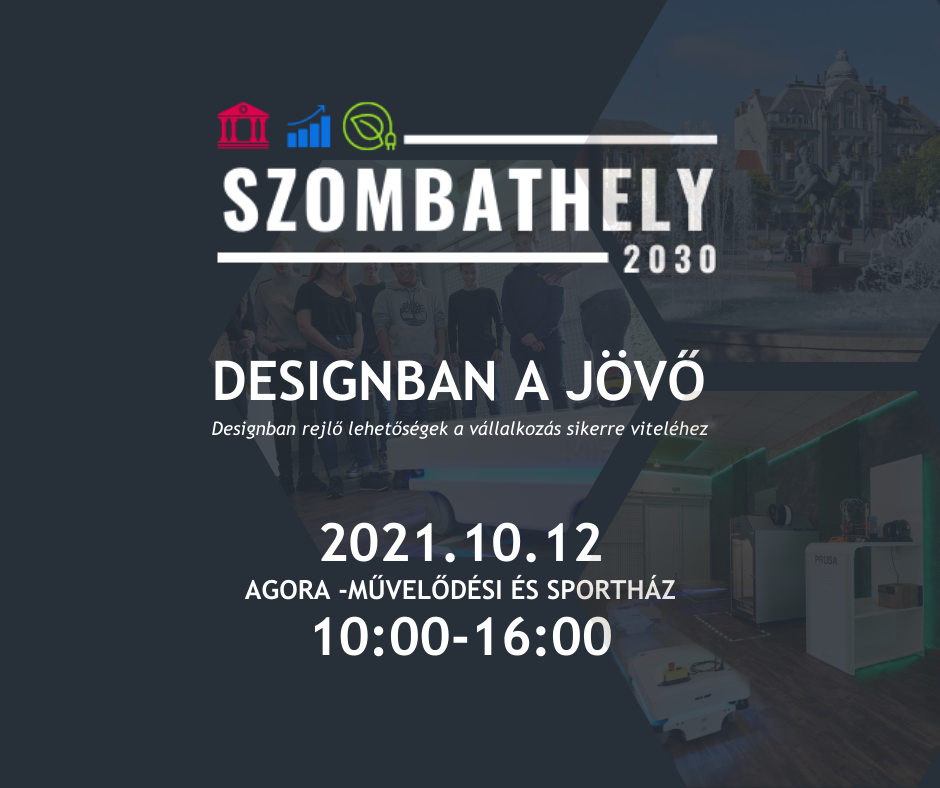 |
|
In addition, a conference will be organized in Szombathely in the framework of the Design week. Those who are interested can learn about the role and significance of design, from the product idea through the sale process, to the way of protecting and distributing the individual design idea.

|
PBN’s spin off company – am-LAB (https://www.am-lab.hu/en/index.php ) – will actively participate in the local event. Experts from am-LAB will hold an interactive digitalisation workshop for the participants and demonstrate how they use modern digitalisation tools (3D printer, 3D scanner, HoloLens, collaborative robots).
More info, promotional material and a link to the Design Week events are soon to come on social media!
|
----------------------------------------------------------------------------------------------------------------------------------
| |
|
Internationalisation, networking, and collaboration search platform
part 1
|
| |
Do you remember the project’s 1st Policivil Workshop organized by the two RESTART_4Danube teams from Craiova, which we presented in our 3rd newsletter in March 2021? Having gathered a large number of stakeholders coming from different backgrounds, our partners managed to convince relevant actors of the importance and opportunities that would emerge from the implementation of the LAP on urban regeneration supporting innovation and entrepreneurship in Craiova. Brimming with innovative ideas on how to improve the urban setting, living and business circumstances, most of these actors who come with original technologies do not only want to be part of the organization, but they intend to connect, network and internationalise.
For this reason, we are opening up this section in RESTART_4Danube’s three-monthly newsletter. We herewith provide a space for our stakeholders to present themselves, their innovative products and express their search for partners and intention to do technology transfer.
In this edition, we introduce two of the Craiovan stakeholders. With their agreement, we make their contacts public and strongly encourage interested parties to initiate the dialogue with them!
|
| |
|
1) MOBUR - SMART BENCH for designers
|
| |
A Romanian software company, VISUAL AGENCY SRL, specialized in providing ITC solutions developed a smart bench for designers.
Description of the product:
Self-powered smart urban street furniture can help cities and communities to increase the attractiveness of public spaces by providing public services, information and connectivity, while at the same time enabling the collection of valuable data for optimizing processes and reducing costs. The company is looking for financial agreement.
Whether we talk about recycle bins, smart benches, or even fully integrated smart bus stops – there are a lot of new products available in terms of smart urban street furniture. A growing number of cities and communities throughout the world are adopting these self-powered products to make life easier for citizens and visitors and to optimize the management of public infrastructure or to provide connectivity such as free Wi-Fi.
- Free solar-powered phone/electronic device charging points;
- Wi-Fi connectivity;
- Delivery of public services and citizen information on screens that can be updated easily
- Saving energy that would otherwise be consumed by electric powered street furniture (energy provided by the city) or in private households/companies (charging of electronic devices) – thus also leading to lower costs;
- Collecting big data to improve public services (e.g. pedestrian traffic, status of recycle bins, number of people in bus station, use of public facilities, and comparison of different locations).

Contact details:
Meleandra Claudiu
Manager
Tel: 0040 763374178
E-mail: printcraiova@gmail.com, contact@mobur.eu
www.mobur.eu
Social headquarters of the company: Aleea 2 Castanilor, no. 8, Sc.1, Ap.7, Craiova city, Dolj County, South-West Oltenia region, Romania
|
|
Description of the company:
Caelynx was founded in 2005 in Ann Arbor Michigan by Joe Formicola. Joe has over 25 years of technical and management experience in R&D and engineering consulting environments. His experience has given a unique insight into the understanding of product development processes.
In 2007, Stefan Castravete, PhD in mechanical engineering at the Wayne State University in Detroit, Michigan, joined the Caelynx team. With over 15 years of technical and management experience in R&D and engineering consulting environments and with a strong theoretical background in mechanical engineering on topics including deterministic and random vibrations, aero-elasticity, aerodynamics, linear and nonlinear dynamics, structural analysis & fluid dynamics, acoustics, optimization, Stefan can take over a customer’s problem from the concept phase, the product development phase, validation and optimization. In 2008, Stefan together with Joe founded Caelynx Europe in Craiova, Romania.
In 2012 Caelynx became a Dassault Systemes partner in the US for Dassault SIMULIA and CATIA products. In 2013 Caelynx Europe has also become a Dassault Systemes partner in Romania and Bulgaria for Dassault SIMULIA products. Also in 2013 it became an ECS partner for FEMFAT.
Services and products of the company:
The company offer promptly and professionally technical advice on digital product development and irreproachable engineering services in automotive, aerospace, energy, defence, medicine: 3D modelling, scalable digital simulation and CAE analysis. The solutions that are offered ensure the optimization of the product development process, by improving product design and reducing prototype development costs.
Caelynx offers a computer-aided engineering providing expedient, reliable consulting services to the world’s finest in automotive, energy, defence, medical, and aerospace industries.
With connected, experienced professionals in Europe and the United States, Caelynx Europe offers clients an expansive range of design and analysis capabilities on demand and within budget:
- FEA (Finite Element Analysis): structural and thermal analysis, NVH, multi-body dynamics, impact, fatigue, and more.
- CFD (Computational Fluid Dynamics): complete capability, including Fluid Structure Interaction
- Plastics mold flow simulation
- Design: complex castings, plastics, mechanisms, assembly.
- Aerodynamics: airfoil calculation, lift and drag prediction, flutter, stability
- Power-train Analysis: internal combustion engines, transmissions, generators
- Optimization tools: NL optimization w/ complex shape variables
- Crash and Impact Analysis: vehicle crash according to ECE-UN Regulations and EC Directives, occupant kinematics, bird strike,
- Materials characterization: composite, hyperplastic, metals fracture
The company has developed an innovative hybrid CPU-GPU cluster system and is looking for business partners to implement this system as well as business partners who need virtual design and simulation services.
The Romanian company proposes an innovative CPU-GPU hybrid cluster system, which includes GPU processors and modules with state-of-the-art CUDA capabilities.
The interconnection between the computing nodes is done through a specialized interface - EDR - which offers a bandwidth of 100 Gb/s and an extremely low latency.
By using the proposed HPC system, the reduction of the simulation time is obtained, an important element in the design of the systems that involve large models corroborated with the observance of the delivery/ delivery terms.
By implementing the HPC system described above in the Romanian company the following types of numerical analysis are possible:
- Static structural analysis: > 1.5 million number of degrees of freedom
- Dynamic structural analysis: > 2 million degrees of freedom
- Whole vehicle crash analysis: > 5 million degrees of freedom and up to 50-100 million degrees of freedom
- Vibration analysis: 30 million maximum numbers of degrees of freedom
- Fluid dynamics analysis - CFD: ex. 100 million volume items
- Stationary regime
- Non-stationary regime
- Incompressible environment
- Compressible medium
- RANS turbulence models
- LargeEddySimulation (LES) turbulence models, impossible to run on existing computing equipment. From the point of view of accuracy, the LES model is currently the closest to reality and certain phenomena can only be observed in the presence of this model.
- Thermal analysis (heat transfer): 100 million maximum numbers of degrees of freedom
- Electro-magnetic, magneto-static analysis: > 1.5 million degrees of freedom
- Acoustic analysis: > 1.5 million degrees of freedom
- Structurally-acoustically coupled analysis
- Structurally coupled analysis of fluid dynamics
- Aero acoustics that includes only LES turbulence models
- Thermal conjugate analysis in non-stationary regime.
Contact details:
PhD. Eng. Stefan Cristian Castravete
Manager
Tel: 0040 729104330/ 0040 351176969
E-mail: scastravete@caelynx.ro
www.caelynx.ro
Craiova City, Dolj county, Romania
|
----------------------------------------------------------------------------------------------------------------------------------
|
After more than one year, it is becoming evident that the work of RESTART_4Danube’s consortium is having effects on a larger scale and moving the Danube region forward. After having scouted and analysed the situation of CCIs, the partners rose awareness and made their plans known to regional authorities, businesses, universities & researchers and the civil society alike.
We outened our willingness for collaboration and started building synergies with related projects. We motivated stakeholders to join our cause and involved them in our initiatives.
Now, the reshaping of the environment for creatives, businesses and innovation can start!
Feel free to connect with us also!
|
|
|
|
| |
|
If you have received this newsletter, you have been included on one or more of the Danube Transnational Programme/projects postal mailing lists. We are committed to respect and protect the privacy of personal data collected. We regard your personal data as confidential information and will never communicate it to third parties. Your personal data are used mainly for the express purpose of receiving the newsletter. Your mailing details may also be used by the DTP and its projects for information and dissemination purposes strictly related to the programme and its projects. If you prefer not to receive more of this newsletter and your data not to be used for dissemination purposes, you can unsubscribe by sending a reply email.
|
|
|
|
|
|
